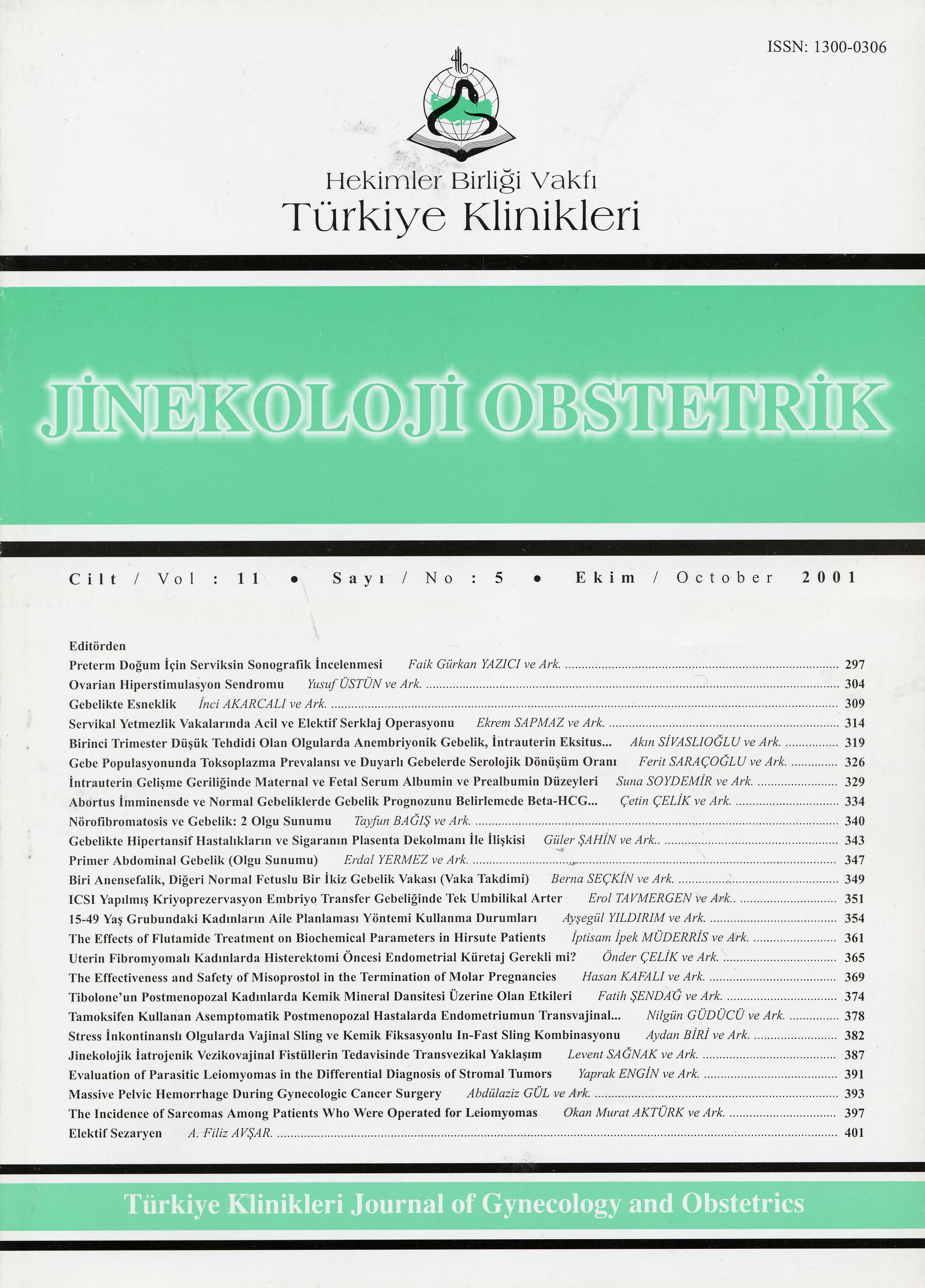Open Access
Peer Reviewed
ARTICLES
4086 Viewed1014 Downloaded
The Effects Of Flutamide Treatment On Biochemical Parameters In Hirsute Patients
Hi̇rsuti̇smli̇ Hastalarda Flutami̇d Tedavi̇si̇ni̇n Bi̇yoki̇myasal Parametreler Üzeri̇ne Etki̇si̇
Turkiye Klinikleri J Gynecol Obst. 2001;11(5):361-4
Article Language: TR
Copyright Ⓒ 2025 by Türkiye Klinikleri. This is an open access article under the CC BY-NC-ND license (http://creativecommons.org/licenses/by-nc-nd/4.0/)
ÖZET
Amaç: Flutamid 250-500 mg/gün tedavilerinin serum lipidler, apoproteinler, Lp(a) ve üzerine etkisinin araştırılması. Çalışmanın Yapıldığı Yer: Erciyes Üniversitesi Tıp Fakültesi Kadın Hastalıkları ve Doğum, Endokrinoloji ve Biyokimya AD, Kayseri. Materyel ve Metod: Çalışmaya 60 hasta alındı. Grup I (n=20) 250 mg/gün, Grup II (n=20) 500 mg/gün Flutamid verildi, ayrıca çalışmaya 20 sağlıklı kadın kontrol grubu olarak alındı. Her iki grubun tedavilerine 12 ay süreyle devam edildi. Serum total kolesterol, trigliserid, HDL-kolesterol, apoprotein A, apoprotein B, Lp(a) ölçüldü, LDL-kolesterol (LDL-C) Friedewald formülü ile hesaplandı. Total testosteron (TT), free testosteron (fT), FSH, LH, E2, DHEAS, androstenodion (A), 17 hidroksiprogesteron (17 OHP) sex hormon binding globulin (SHBG) ve PRL hormonları ölçüldü. Sonuç: Hirsutism skorları Grup I ve Grup IIde sırasıyla 17.00±5.34den 4.11±2.47 (p<0.001), 17.47±4.90dan 5.12±3.14 (p<0.001)e düştü. Biyokimyasal parametrelerde ise gruplar arasında belirgin fark gözlenmedi (p>0.005). Her iki tedavi grubunda serum total kolesterol, trigliserid, LDL-kolesterol, apoprotein B, Lp(a) seviyelerinde artış, HDL-kolesterol seviyelerinde azalma gözlendi. Serum hormon seviyelerinde tedavi öncesi ve sonrası belirgin değişiklik gözlenmedi. Tartışma: Flutamid tedavisinin lipid profiline, apoproteinler ve Lp(a) seviyelerine etkili olmadığı kanaatindeyiz. Flutamid tedavisi ile yapılan periferik androjenik blokajın hirsute hastalarda CAD riskini azaltmadığı görülmektedir.
Amaç: Flutamid 250-500 mg/gün tedavilerinin serum lipidler, apoproteinler, Lp(a) ve üzerine etkisinin araştırılması. Çalışmanın Yapıldığı Yer: Erciyes Üniversitesi Tıp Fakültesi Kadın Hastalıkları ve Doğum, Endokrinoloji ve Biyokimya AD, Kayseri. Materyel ve Metod: Çalışmaya 60 hasta alındı. Grup I (n=20) 250 mg/gün, Grup II (n=20) 500 mg/gün Flutamid verildi, ayrıca çalışmaya 20 sağlıklı kadın kontrol grubu olarak alındı. Her iki grubun tedavilerine 12 ay süreyle devam edildi. Serum total kolesterol, trigliserid, HDL-kolesterol, apoprotein A, apoprotein B, Lp(a) ölçüldü, LDL-kolesterol (LDL-C) Friedewald formülü ile hesaplandı. Total testosteron (TT), free testosteron (fT), FSH, LH, E2, DHEAS, androstenodion (A), 17 hidroksiprogesteron (17 OHP) sex hormon binding globulin (SHBG) ve PRL hormonları ölçüldü. Sonuç: Hirsutism skorları Grup I ve Grup IIde sırasıyla 17.00±5.34den 4.11±2.47 (p<0.001), 17.47±4.90dan 5.12±3.14 (p<0.001)e düştü. Biyokimyasal parametrelerde ise gruplar arasında belirgin fark gözlenmedi (p>0.005). Her iki tedavi grubunda serum total kolesterol, trigliserid, LDL-kolesterol, apoprotein B, Lp(a) seviyelerinde artış, HDL-kolesterol seviyelerinde azalma gözlendi. Serum hormon seviyelerinde tedavi öncesi ve sonrası belirgin değişiklik gözlenmedi. Tartışma: Flutamid tedavisinin lipid profiline, apoproteinler ve Lp(a) seviyelerine etkili olmadığı kanaatindeyiz. Flutamid tedavisi ile yapılan periferik androjenik blokajın hirsute hastalarda CAD riskini azaltmadığı görülmektedir.
ANAHTAR KELİMELER: Flutamid tedavisi, Biyokimyasal parametreler
ABSTRACT
Objective: To determine the effects of flutamide 250-500 mg/day on serum lipids, apoproteins, Lp(a) and their interactions. Design: Dept. of Obstetrics and Gynecology. Endocrinology and Biochemistry, Medical School of Erciyes University, Kayseri. Methods: Sixty hirsute women were taken to the study. The Group I (n=20) received flutamide 250 mg daily, the Group II (n=20) received 500 mg/day flutamide (250 mg twice a day), and 20 healthy women were served as controls. Both treatments were administered oraly for 12 months. Serum total cholesterol triglycerides, HDL-cholesterol (LDL-C) were calculated by Friedewald formula, Total serum testosterone (T), free testostereno (fT) FSH, LH, E2, DHEAS, Androstenedione (A), 17-Hydroxyprogesterone (17-OHP), Sex hormone-binding globulin (SHBG), and PRL were determined. Results: The hirsutism scores decreased in Group I and Group II from a mean of 17.00±5.34 to 4.11±2.47 (p<001), 17.47±4.90 to 5.12±3.14 (p<0.001) respectively. No significant differences between Group I and Group II at biochemical parameters (p<005). The elevation of serum triglyceride, total cholesterol, Apo B, Lp(a), LDL-cholesterol, and the decrease of HDL-cholesterol were observed in both treatment groups. No significant changes in the serum hormon levels were found between groups before and after treatment. Conclusions: We suggest that flutamide therapy appears to be not effects on lipid profiles, apolipoproteins and Lp(a) levels. Peripheral androgenic blockage with flutamide does not modify the risk of CAD which increased in the hirsute patients.
Objective: To determine the effects of flutamide 250-500 mg/day on serum lipids, apoproteins, Lp(a) and their interactions. Design: Dept. of Obstetrics and Gynecology. Endocrinology and Biochemistry, Medical School of Erciyes University, Kayseri. Methods: Sixty hirsute women were taken to the study. The Group I (n=20) received flutamide 250 mg daily, the Group II (n=20) received 500 mg/day flutamide (250 mg twice a day), and 20 healthy women were served as controls. Both treatments were administered oraly for 12 months. Serum total cholesterol triglycerides, HDL-cholesterol (LDL-C) were calculated by Friedewald formula, Total serum testosterone (T), free testostereno (fT) FSH, LH, E2, DHEAS, Androstenedione (A), 17-Hydroxyprogesterone (17-OHP), Sex hormone-binding globulin (SHBG), and PRL were determined. Results: The hirsutism scores decreased in Group I and Group II from a mean of 17.00±5.34 to 4.11±2.47 (p<001), 17.47±4.90 to 5.12±3.14 (p<0.001) respectively. No significant differences between Group I and Group II at biochemical parameters (p<005). The elevation of serum triglyceride, total cholesterol, Apo B, Lp(a), LDL-cholesterol, and the decrease of HDL-cholesterol were observed in both treatment groups. No significant changes in the serum hormon levels were found between groups before and after treatment. Conclusions: We suggest that flutamide therapy appears to be not effects on lipid profiles, apolipoproteins and Lp(a) levels. Peripheral androgenic blockage with flutamide does not modify the risk of CAD which increased in the hirsute patients.
MENU
POPULAR ARTICLES
MOST DOWNLOADED ARTICLES





This journal is licensed under a Creative Commons Attribution-NonCommercial-NoDerivatives 4.0 International License.










